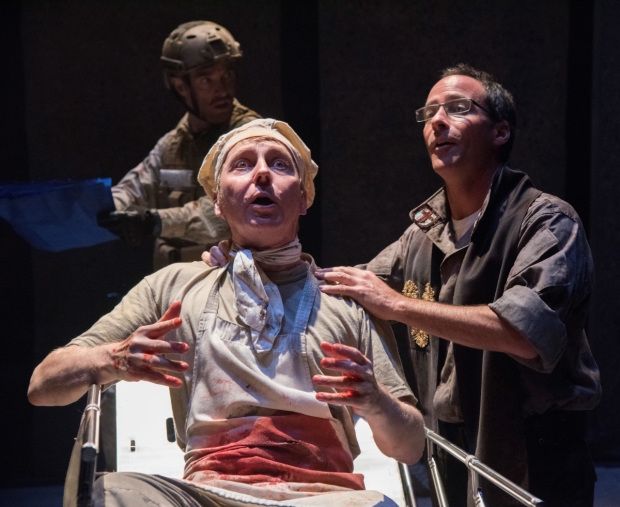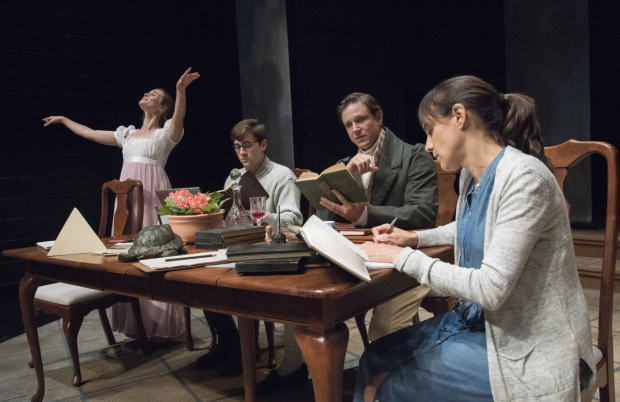
(© Stan Barouh)
Potomac Theatre Project is serving up nihilism in repertory to kick off its 31st season. Howard Barker remains a company mainstay with his 1985 BBC teleplay Pity in History, making its theatrical premiere at the Atlantic Stage 2 alongside Tom Stoppard's Arcadia, which debuted in London in 1993 and has been mounted twice on Broadway. Each is dense with language and musings on the relationship between past, present, and future — and paired together, the number of layers to dig through increases exponentially. The double header is not for the casual theatergoer, but is worth the effort if you're in the market for some intellectual heavy lifting delivered by a company of actors who forsake highbrow pomposity for sincere understanding of their work.
Barker's Pity in History, directed with unabashed grit by Richard Romagnoli, takes place in Britain during the English Civil War (a dismal gray overtaking Mark Evancho's set that approximates a battlefield, workshop, and crypt all in one space). As the bedlam of war has unfortunately allowed, a cook named Murgatroyd (a Monty Python-esque Jonathan Tindle) has just been fatally shot and monologues his time away with the sardonic wit of a man who knows now for sure that God — if He does exist — is not working on the side of justice. As bullets fly between the Parliamentarians and the Royalists — both groups confidant that divine rightness is on their side — we meet the mason Gaukroger (an excellent Steven Dykes) and his apprentice Pool (Matt Ball, who has a satisfying shift from naïf to sage over the course of the play). As artists, they are responsible for making works that document, immortalize, and heighten this moment in history — to make something beautiful from all the ugliness. It's tragic blow (particularly as delivered within the context of Barker's own work of art) comes when Gaukroger's works are threatened by pillaging soldiers — a scenario that strongly smacks of the destruction of Syrian artifacts that has become commonplace since the rise of ISIS (Danielle Nieves's contemporary costumes loosen the play's shackles to 17th-century England as well).
The world Barker paints in his hour-long drama is one turned cold and chaotic by the selfishness of man. In Stoppard's Arcadia, the world is just as chaotic — though it is that way in spite of our best efforts to bring it to order. This production is undeniably the main event of the repertory season — in part because of its Shakespearean length (its run time is nearly three times that of Pity in History), but primarily because of its epic scope of storytelling that director Cheryl Faraone wrangles into a digestible and diverting piece. It's an excellent introduction to one of Stoppard's most famous works, which, like the deterministic philosophy it introduces through the brilliant scientific minds of its characters, illustrates the beauty that can come out of inevitable disorder.

(© Stan Barouh)
The principle grounding Arcadia is that of "deterministic chaos" — the idea that while events may not be predictable, they are in fact scientifically determined. It's a sophisticated concept proposed by the unsuspecting Thomasina Coverly (played by the charming Caitlin Duffy), the perky young student of Septimus Hodge (Andrew William Smith). Hodge tutors her at an English country house in Derbyshire (a fresh set by Evancho indicating the propriety and cleanliness of English aristocracy) while seducing all of the women on the premises. Nearly 200 years later (costume designer Mira Veikley literally depicting the clothing of the contrasting time periods as opposed to Nieves's modern interpretation of Pity in History's 17th-century garb), Hodge and his tenure at Derbyshire become a topic of intrigue. University professor Bernard Nightingale (Alex Draper, who manages to remain amiable in his arrogance) hopes to prove that his friend, the great Lord Byron, killed the poet Ezra Chater (another great comic performance by Jonathan Tindle) in a duel, while author Hannah Jarvis (a powerful and fully self-possessed Stephanie Janssen) also works from the Derbyshire property to uncover the history of a mysterious hermit of Sidley Park who worked furiously on algebraic computations about the impending death of the universe.
As Bernard and Hannah work together (or in spite of each other) to solve their respective mysteries, the picture of the past comes into focus as if it were the product of its own cosmic formula (while also implicating the present as subject to the same predetermined chaos). Science and poetry are rarely as harmonious as they in Arcadia, which ends on a visually stunning note that wordlessly ties past to present and present to future. It's a lineage that Barker acknowledges with more menacing tones, warning of our responsibility to preserve our mortal legacy despite our instincts toward destruction. If Thomasina is right, we may not be as powerful as all that — but there's something nice about believing in the present moment that what comes next is up to us.








